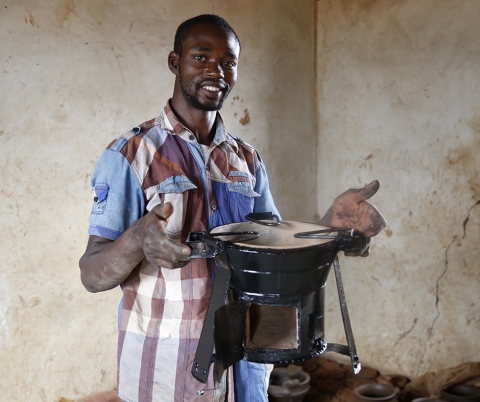Providing Clean Fuel for the Developing World (2020-2021)
Indoor air pollution from burning solid fuels causes approximately four million premature deaths annually, making it the leading cause of death after high blood pressure and smoking. Cleaner fuel sources can improve health while preserving forests, improving local air quality and mitigating impacts on climate change.
This project team tackled the challenges involved in developing, translating and promoting new technologies, focusing, in particular, on “green hydrogen” projects. Team members developed an alkaline water electrolyzer and hydrogen storage system that can provide fuel for cooking and heating at a lower cost than using electricity from an electrochemical battery (e.g., lithium ion or lead acid), eliminating the need for a supply chain.
The electrolyzer uses a novel design for the electrode that is optimized to allow the electrolyzer to produce large quantities of hydrogen when electricity is abundant and cheap. At a small scale, the team successfully carried out electrolysis with a current density 50 times that of current commercial alkaline electrolyzers. This project team’s work was to scale up the surface area of the electrode by 25 times, going from a 4mm square electrode to a 2cm square electrode. Team members achieved current densities that are about 45% of the small-scale results, and are currently working to improve upon that.
Team members also worked on creating a small-scale gas compressor, which uses a pump to compress a gas bladder immersed in water. As it is free of moving parts and oil-based lubricants, this compressor is safe for use with even highly flammable gases like hydrogen. Building off the work of previous teams, team members were able to successfully, repeatedly compress and release gas using this system for the first time. However, after measuring the efficiency of this process, team members determined that the current design is not efficient enough to be of much practical use. In 2021-2022, the team will continue the project by replacing the water pump with one that is designed to be more energy efficient.
Timing
Spring 2021 – Fall 2021
Team Outputs
Pilot system for producing, storing and burning hydrogen
This Team in the News
Becca Lau: Pandemic Pivot Enables Materials Science for Future Nanomaterials
See related teams, Providing Clean Fuel for the Developing World (2021-2022) and Providing Clean Fuel for the Developing World: Technology Is Not Enough (2019-2020).
Image: Hussein D'Oto, a potter making clean cookstoves in Tanzania, by DFID UK Department for International Development, licensed under CC BY 2.0

Team Leaders
- Nico Hotz, Pratt School of Engineering-Mechanical Engineering & Materials Science
- Benjamin Wiley, Arts & Sciences-Chemistry
/undergraduate Team Members
-
Jeremy Fertig, Mechanical Engineering (BSE)
-
Rebecca Lau, Mechanical Engineering (BSE)
-
Kevin Peng, Mechanical Engineering (BSE)
/yfaculty/staff Team Members
-
Marc Jeuland, Sanford School of Public Policy
